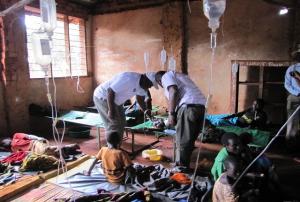Cholera crisis in Tanzania improving despite high transmission risk
Kagunga, 26 May 2015 – The ongoing cholera outbreak in western Tanzania appears to be improving thanks to intensive national and international efforts, but the risk of transmission remains high due to limited access to shelter, toilets, water and essential medical care. As of 25 May, the total number of cases diagnosed and treated was 4408 and no deaths have been reported between 21-24 May.
Burundian refugees continue to enter Tanzania through various entry points such as Kagunga village, Manyovu border post and other unofficial entry points. New arrivals on 24 May were 193, of these 67 were through Kagunga. As of 24 May, the United Nations High Commissioner for Refugees (UNHCR) reported 5929 refugees at Kagunga, 40 519 in Nyarugusu, and a fluctuating number of about 4000 at Tanganyika Stadium due to rapid arrivals and departures.
World Health Organization (WHO) Representative for Tanzania, Dr Rufaro Chatora, visited Kagunga, Tanganyika Stadium, and Nyarugusu refugee camp over recent days to assess the humanitarian crisis and identify ongoing needs. “Despite significant improvements, especially at Kagunga, the crisis remains dire. The pressure has now shifted to Tanganyika Stadium and Nyarugusu refugee camp where the sudden increases in population have resulted in very limited access to clean water, poor sanitation and inadequate access basic health care services,” says Dr Chatora.
The most vulnerable groups include pregnant women, children, elderly people and those needing special attention such as people living with HIV/AIDS or people with chronic illnesses. Many of the refugees are also affected by malaria, and some have no access to their medicines.
Dr Chatora says there is a need to further strengthen coordination mechanisms to scale-up the provision of health care services and basic shelter, food, water and protection services to the high risk populations. “The priority in coming days is stepping up the response including intensifying treatment and prevention of cholera, ensuring adequate supply of medicines and supplies, and improving access to clean water,” he adds.
“The prompt response by WHO, UN Agencies, the Ministry of Health and Social Welfare and other partners has greatly contributed to reducing the number of cholera cases but the crisis is far from over and significant challenges remain ahead.”
WHO, through the Ministry of Health and Social Welfare (MOHSW), has mobilized the deployment of 12 health experts to support cholera case management in Kagunga and Tanganyika Stadium Cholera Treatment Centres, and provided medicines and supplies to all three sites to treat more than 60 000 people for cholera, acute watery diarrhoea, and common diseases like malaria for three months. WHO has also deployed international experts in Outbreak and Disaster Management, Surveillance and Data Management.
WHO is supporting the MOHSW in its efforts to coordinate the health sector response and to respond to the health needs of the asylum seekers and local populations in and around the Kigoma region. Other key stakeholders in the response include UNHCR, United Nations Children's Fund (UNICEF), United Nations Population Fund (UNFPA), International Rescue Committee (IRC), Red Cross, Médecins Sans Frontières (MSF), Tanzania Water and Environmental Sanitation (TWESA), CARITAS, Plan International, and World Food Programme (WFP).
_________________________________________
For more information, please contact:
Communications contacts:
WHO Country Office, United Republic of Tanzania
Dr Neema Kileo; Tel: +255 755 551804; Email: kileon [at] who.int (kileon[at]who[dot]int)
WHO Regional Office for Africa
Dr Cory Couillard; Tel: + 472 413 9995; Email: couillardc [at] who.int (couillardc[at]who[dot]int)
WHO Headquarters, Geneva
Paul Garwood; Tel: +41 79 6037294; Email: garwoodp [at] who.int (garwoodp[at]who[dot]int)
Christian Lindmeier; Tel: +41 79 5006552; Email: lindmeierch [at] who.int (lindmeierch[at]who[dot]int)



